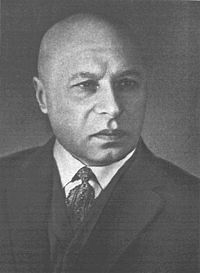Alexander Davydov Scientist
Alexander Sergeevich Davydov (Russian: Александр Сергеевич Давы́дов) was a Soviet and Ukrainian physicist. Davydov graduated from Moscow State University in 1939. In 1963-1990 he was Director of Institute for Theoretical Physics of the Ukrainian Academy of Sciences.His main contributions were in theory of absorption, scattering and dispersion of the light in molecular crystals. In 1948, he predicted the phenomenon that is known as Davydov splitting or factor-group splitting, "the splitting of bands in the electronic or vibrational spectra of crystals due to the presence of more than one (interacting) equivalent molecular entity in the unit cell."[1] In the period 1958-1960 he developed the theory of collective excited states in spherical and non-spherical nuclei, known as Davydov-Filippov Model and Davydov-Chaban Model.In 1973, Davydov applied the concept of molecular solitons in order to explain the mechanism of muscle contraction in animals. He studied theoretically the interaction of intramolecular excitations or excess electrons with autolocal breaking of the translational symmetry. These excitations are now known as Davydov solitons.
Search
Scientist
| awards | |
|---|---|
| Field of study |
